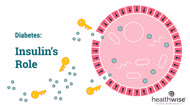Medication
Diabetes: Insulin's Role
As you learn about diabetes, you'll hear a lot about insulin.
With type 1 diabetes, the body doesn’t make enough insulin.
With type 2 diabetes, the body makes insulin, but your body has trouble using the insulin it makes.
And it may not make enough.
It can help to understand insulin's role on a deeper level, and, by deep, I mean inside the body.
Let’s start with glucose and how it works with insulin.
Glucose is a type of sugar made from the food you eat.
Insulin is a hormone that's made by your pancreas.
Insulin and glucose are supposed to work together.
Your body needs insulin to move sugar from the blood to other parts of the body, where the sugar is used for energy or stored in case it's needed later.
Insulin acts like tiny keys that open your body’s cell doors to let glucose in.
If you have diabetes, the keys don't always fit the way they're supposed to, or there are not enough keys.
When this happens, your cells don't get the sugar they need, and too much sugar builds up in your blood.
This is called hyperglycemia or high blood sugar.
When your blood sugar is higher than normal, you may feel tired.
When it's not treated, high blood sugar can cause future problems in other parts of your body, including your eyes, nerves, heart, and kidneys.
The main way to treat type 1 diabetes is by using insulin in the form of a medicine.
Some people with type 2 diabetes can stay in their target blood sugar range with healthy eating and exercise.
But others also need medicines, which may include insulin.
There are different types of insulin.
You and your doctor or diabetes educator will work to find what's right for you.
As a medicine, insulin acts like a universal key that opens cells so the sugar doesn't stay in your blood.
If you ever need a reminder of why it’s important to take care of yourself when you have diabetes, it may help to think about what insulin is and what it does for your body.
When you take care of your body, you'll help protect your eyes, nerves, heart, and kidneys.
Not only that, you'll feel better and be able to do more of the things you like to do.
Credits
- Current as of
- 07 07, 2025
- Author
- Medical Review
-
